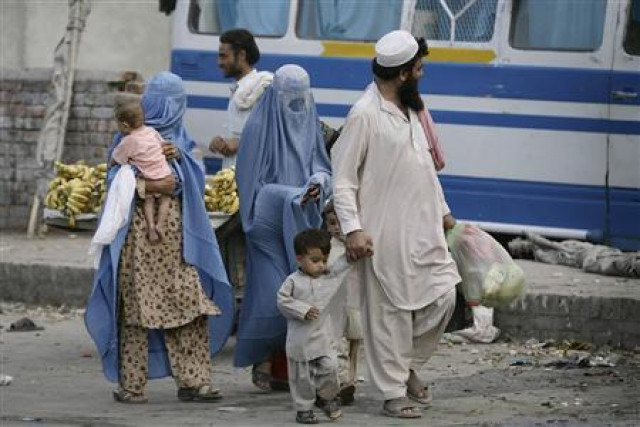Repatriation and the roots of economic slowdown
Departing Afghan nationals find it difficult to fetch reasonable prices for properties

n Hayatabad, these shops are packed with imported goods. Lately, these goods have been sold at throwaway prices. This has adversely affected the owners of the shops and the businesses of other traders in the same vicinity. PHOTO: REUTERS
It appears circumstances have changed. Most Afghan nationals have realised that host authorities are in no mood to reverse the decision to send them packing. The imminent return of Afghan nationals is now the talk of the town and has gripped K-P with an iron fist. Over time, the crisis has even seeped into conversations held at high-level meetings in Islamabad and Peshawar.

But the vocabulary of these discussions is different in Peshawar, Nowshera and several other cities and towns throughout the province where Afghan nationals own businesses and properties.
Many of them are plagued by the fear that their businesses and investments will collapse. They are willing to dispose of their wealth for reasonable and justified returns. However, most fortune-seekers who are interested in purchasing it have their own pricing demands.
Victims of circumstance
Following the Soviet invasion in Afghanistan in 1979, a large number of Afghan refugees crossed the border and began their lives from scratch in Pakistan.
However, such forms of migration are neither new nor entirely exclusive to the region and Afghan nationals are not the first to leave their homes in search of better prospects. Thousands of Afghan nationals also abandoned their homes after King Amanullah Khan was overthrown in 1929. Similarly, people from several republics in Central Asia, Iran and even Turkey, are known to migrate to achieve a better living standards in more prosperous economies.
To cut a long story short, Afghanistan has remained a battlefield of imposed internal hostilities for a long time. As a result, thousands of families decided to break away from an endless cycle of misery and settle in Pakistan.
Entrepreneurial flair
Afghan nationals are considered hard working. They prefer living in their own houses instead of residing in rented accommodation. Many of them give priority to running their own businesses rather than becoming employees, servants or workers.
As a result, many Afghan nationals begin investing in property and businesses soon after they shift to any part of the world.
A majority of Afghan nationals in K-P own properties and businesses irrespective of whether they have registered themselves with the relevant authorities or not. There is no complete and authentic data available in this respect. However, it is widely believed that in Peshawar 45,000 Afghan nationals are earning a living by driving vehicles. Similarly, thousands of others own shops, markets and bakeries.
In Nowshera, 4,000 Afghan families own businesses and properties.
Amid losses
But now, as Afghan nationals begin to steadily fall out of favour with the administration, it seems hard for them to fetch reasonable prices when selling their businesses and properties.
In Gulberg, Peshawar, an Afghan family purchased a piece of land on the name of friend. They spent Rs6 million on constructing a house on it. However, they are unable to find a buyer who would be willing to pay the amount they have invested or more for the house.
Nazar and his brothers, who once ran successful scrap businesses for a long time, now find themselves in a quandary.
Ahad, Nazar’s younger brother, says, “I am facing losses of over Rs2 million as dealers have adopted delaying tactics.”
In commercial areas of Peshawar, shops are predominantly owned and run by Afghan nationals. In Hayatabad, these shops are packed with imported goods. Lately, these goods have been sold at throwaway prices. This has adversely affected the owners of the shops and the businesses of other traders in the same vicinity.
This trend is neither in interest of Afghan nationals who are leaving the country nor those in the host country. At this critical juncture, inter-dependency between the people and governments could either be reduced or be eliminated. As tensions begin to simmer, it has become imperative for host authorities to evolve a strategy which can enable Afghan nationals to obtain justified returns on their investments. This could prevent the slump in the market which could harm the economic strategies of the incumbent government.
Published in The Express Tribune, August 1st, 2016.













COMMENTS
Comments are moderated and generally will be posted if they are on-topic and not abusive.
For more information, please see our Comments FAQ